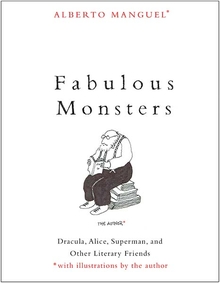
On Monsieur Bovary, One of Literature's Most Necessary Characters
Alberto Manguel Considers the Bore Who Inspires Passion
Of the two, he is the second fiddle, the more prosaic, the least impulsive, the one resigned to a decent state of anonymity, the one with whom Flaubert does not identify. He is the one who gives Emma an excuse for her infidelity, though he has never demanded that she be faithful to him. He is the one who leads an honest, regular, hard-working life, with no other ambition than that of quiet contentment, with no surprises.
True, he lacks charm. No one feels for him an all-consuming passion, no one imagines him climbing balconies at night or fighting a duel in a snow-covered glade. And yet, Monsieur Bovary is an absolutely necessary character. Let us remember that Madame Bovary begins and ends with him, not with Emma. Without him, Emma would have no meaning, she would never become a romantic heroine, she would never know passion or ecstatic bliss. Let me be clear: Monsieur Bovary exists so that Madame can fulfill her tragic destiny.
The truth is that Charles Bovary lacks imagination. His rather stolid behavior is the fruit of a lackluster life drawn in black and white. Even as a boy, he is a bit of a nerd. In the first pages of the novel, Flaubert describes him as a clumsy and timorous adolescent who can barely say his name in answer to the teacher’s question. He inspires neither trust nor tenderness.
On the first day of class, the teacher has him copy out 20 times “I’m ridiculous.” The boy makes no complaint. Later, it is his father who decides that he will study medicine and his mother who chooses for him a place to live. Charles, who has now become Monsieur Bovary, allows others to make all decisions for him.
Artistic truth is alien to his spirit. Sentimental fiction (“women’s novels” as he calls them), in which Emma finds her models, has no meaning him. For Monsieur Bovary, fiction does not exist. In the theater, attending with Emma a performance of Lucia di Lammermoor and seeing the passion with which Edgar declares his love for the heroine, he wonders, “But this gentleman, why is he harassing her?” “But no,” Emma answers impatiently. “He’s her lover.”
Emma Bovary cannot make her husband see that, just as when one attends an opera, amorous passion in real life cannot be explained.
Charles still does not understand. “Oh shut up!” Emma snaps back. Innocently, he defends himself: “It’s just that, as you know, I like to understand what’s going on.” Emma cannot make him see that, just as when one attends an opera, amorous passion in real life cannot be explained: one has a gut understanding of the thing, or one is excluded from it forever. In matters such as these, Monsieur Bovary is for the most part the outsider.
Lucia’s tragic story and Donizetti’s music make Emma recall her wedding day. Compared to the ecstatic passion lived out onstage by the performers, the joy of those longpast hours seems to her “a lie imagined because there was no hope for desire.” This is a curious observation: Emma conceives artistic creation as something that stems not from our desires but from our lack of desire.
What does this tell us about Flaubert himself, who spent his life fulfilling (or attempting to fulfill) his erotic fantasies? If he believed in what he has Emma believe, what should we believe, we, his readers? His own desires or his art? After all, “Madame Bovary c’est moi!” is Flaubert’s best-known line.
Literary spouses are not all self-effacing. Andromache, Clytemnestra, Lady Macbeth have their roles to play, as or more vigorous and memorable as those of their marriage partners. True, Acerbas (husband of Dido), Donna Ximena (wife of El Cid), Alexei Alexandrovich Karenin (husband of Anna) are somewhat vaguer, but few I think have the simultaneously discreet and necessary counterbalancing effect of Charles Bovary.
Passion, imaginative talent, originality, charm—all might be lacking in Monsieur Bovary, but not love. Monsieur Bovary loves his wife. After her death, he strives hard not to forget her, and yet day after day her beloved image seems gradually to fade, and poor Monsieur Bovary is left inconsolable. Only in his dreams does he manage to bring her back as she was: every night he sees her, and he goes towards her, but when he tries to embrace her, Emma dissolves in a mass of rotting flesh.
Shortly after Emma’s death, as an example of literary even-handedness, Monsieur Bovary dies sitting on the same garden bench on which Emma had conducted her amorous affair. Before dying, he forgives his wife’s lover, assures him that he bears him no ill, and says out loud: “Only destiny is to blame!” These are his final words. Maliciously, as a kind of posthumous insult, Flaubert lends the poor man a cliché that would have delighted those future clowns Bouvard and Pécuchet.
But therein lies a paradox. That romantic and trivial literature that Flaubert so obviously despises, and that so greatly delights Emma and no doubt contributes to her misfortune, lends Monsieur Bovary a fitting epitaph. The words on Emma’s tomb are “amabilem conjugem calcas!”: “You are treading on a beloved wife!”—which is neither sentimental nor funny, merely grotesque. However, saying that destiny is ultimately guilty of the kind of life we have led, whether tragic or happy, even if doubtless a cliché, is not for that reason less a truth: immutable, literary, and—why not say so?—brave.
____________________________________

Excerpted from Fabulous Monsters: Dracula, Alice, Superman, and Other Literary Friends, by Alberto Manguel, just published by Yale University Press. Copyright © 2019 by Alberto Manguel. Reprinted by permission of Yale University Press
Alberto Manguel
Alberto Manguel is a writer, translator, editor, and critic, but would rather define himself as a reader. His previous books include The Library at Night and Packing My Library.



















